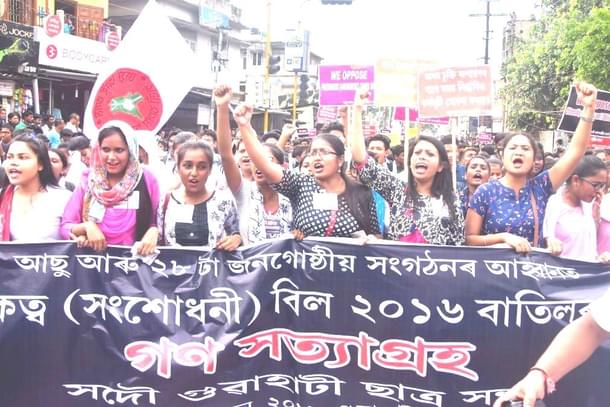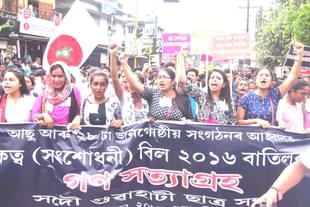Politics
This Is How Anti-CAB Protests Raging Across Northeast Could Have Been Preempted
Jaideep Mazumdar
Dec 11, 2019, 12:30 PM | Updated 12:30 PM IST
Save & read from anywhere!
Bookmark stories for easy access on any device or the Swarajya app.


The protests that raged across the entire Northeast on Tuesday (10 December) against the Citizenship Amendment Bill (CAB) has exposed the groundswell of resentment against this legislation.
What it has also exposed is the failure of the BJP to preempt these protests. The protests have erupted due to fears and misgivings of the people of the Northeast of being swamped by Bengali Hindu migrants from Bangladesh.
The Northeasterners fear that the CAB would open the floodgates of large-scale influx of Hindus from Bangladesh into the six states of the region, thus reducing the indigenous people to a minority in their own states.
The organisations spearheading the anti-CAB protests, and the Congress, which is covertly fuelling it, have held up the example of Tripura where the indigenous tribals have been reduced to a minority (30 per cent) in the state.
Large-scale and unabated migration of mostly Bengali Hindus from East Bengal (and then East Pakistan and subsequently Bangladesh) has resulted in the Tripuris (or Twipras) being reduced to a minority in that erstwhile princely state that was ruled by Twipra kings.
The BJP failed to highlight the fact that the cut-off date for granting Indian citizenship to Bengali Hindus (and five other communities) is December 2014. All those who have entered India or shall enter India illegally after December 2014 will be treated as ‘infiltrators’ and will have to face the law.
The Union government did hold consultations with various organisations — students’ bodies, civil society groups and political parties — before introducing the Bill, but those who attended these ‘consultations’ a couple of weeks ago in New Delhi say they were perfunctory in nature.
According to them, only a “vague assurance” that the interests of the indigenous people of the region would be safeguarded was given at these consultations.
Clearly, the BJP’s political managers could not convince the people of the region that this assurance was sincere. Also, the ‘consultations’ need not have been hurried and held at the last-minute.
The CAB does exempt the entire Arunachal Pradesh, Nagaland, Manipur, Mizoram, Meghalaya and the tribal pockets of Assam and Tripura from its purview. These are tribal states under the Sixth Schedule of the Constitution and areas where the Inner Line Permit (ILP) regulations are in force.
But that exemption has clearly not cut any ice and failed to reassure the people of the region that they will not be reduced to hapless minorities in their own lands, like their Tripuri brethren.
New Delhi has also erred by not exempting the Brahmaputra Valley of Assam — now the epicenter of the anti-CAB protests — from the purview of the Bill.
Assam has borne the brunt, and the huge burden of large-scale influx of Bengali-speaking infiltrators from Bangladesh. In many parts of the state, the Assamese-speaking and the indigenous tribals of the state have been swamped by Bengali-speaking migrants.
Thus, the Assamese-speaking harbour genuine fears about becoming a minority in Assam and losing their identity, culture, traditions and heritage. This fear has not been addressed.
The Union government would have been well-advised to keep the entire region out of the purview of the CAB. That would have calmed the latent fears of the people of the region.
Also, as is the case with Tripura now, the state administrations were not geared up to face the anti-CAB protests. In Assam as well, the state administration seems to have been caught unawares by the scale and intensity of the protests.
Internet services were suspended in Tripura on Tuesday afternoon after rumours of tribal-non tribal clashes and violence began flooding social media. The rumours stoked more tension and Tripura appeared to be on the verge of a conflagration, prompting the state administration to impose the blackout.
The Union government needs to tweak the CAB to exclude the entire Northeastern region from its purview.
And the BJP’s political managers need to launch an intensive campaign to convince the people of the region that the CAB will not affect them. A few measures to shore up the existing guarantees and protections accorded to the indigenous people of the region would also help soothe nerves and calm tempers.
If left unaddressed, the Northeast could once again slide into unrest and violence. And that would cast an ominous shadow on the CAB, which is otherwise a much-needed legislation, while also derailing existing and proposed initiatives under Prime Minister Modi’s ‘Act East’ policy.
Jaideep Mazumdar is an associate editor at Swarajya.





